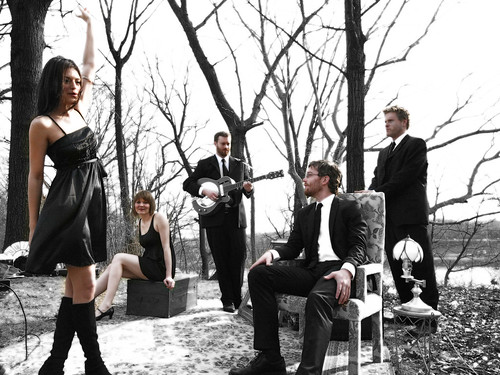
With East Hundred, songwriting is a careful, meticulous process, and the band has been doing a lot of that lately, preparing a ton of new material for upcoming performances and future recording projects.
The band’s practices typically involve breaking down new songs piece by piece and making sure everything down to the vocal phrasing and keyboard tones are just the way all five members want them to sound.
“Everything we do serves the song,” guitarist Brooke Blair said. “Each part, melody, overdub or texture is there to play a role, and it’s been thought about, discussed and practically voted on.”
One of Philadelphia’s freshest unsigned bands, East Hundred combines an ‘80s new-wave vibe with a modern alt-progressive rock edge.
“We like to balance powerful, driven and propelling energy, with tender and personal moments,” Brooke’s brother and drummer, Will Blair added.
There are plenty of those tender moments on the band’s 2009 LP, Passenger, an effort that began as an EP at Drexel’s Mad Dragon Studios and eventually evolved into a full album with the help of Brian McTear at Miner Street Studios. Vivacious lead vocalist Beril Guceri shows off her dynamic vocal range on emphatic choruses wrought with heartache.
“We walk up through rivers of fire/ High tides try to kill off desires/ Slow burning crimes keep us up through the night,” she sings on “Slow Burning Crimes,” the album’s opener.
Guceri, a self-taught vocalist, said she never sang in public before the band formed in 2004.
“I just really wanted to be in a band,” she said. “It was serendipitous.”
The group has gained a steady fan base all on their own; they’ve received regular radio airplay on WXPN and were invited to play as part of the station’s popular XPoNential Music Festival last summer in Camden.
The band is currently discussing their next big project, which could be a four or five song EP in the near future, or even another full-length record later in the year. In either case, it will be another do-it-yourself venture for the band, which is already used to self-recording, self-producing and self-promotion. Without the pressure of a label, they’ve enjoyed having almost endless creative freedom, but also struggled for recognition and distribution.
“The whole music industry is shifting gears,” Blair said. “It’s really a challenge, but I think we’re ready to take things into our own hands and take a shot at something we never thought we could do.”
Kevin Brosky can be reached at kevinbrosky@temple.edu.



Be the first to comment